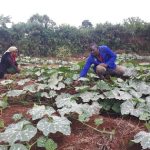Introduction
The Healthy Soil Healthy Food (HSHF) initiative, established by the Alliance for Food Sovereignty in Africa (AFSA) in collaboration with the Seed and Knowledge Initiative, aims to promote agroecology and empower communities in Africa to build local adaptation. By developing soil health management practices, generating local knowledge, and supporting viable enterprises, the HSHF program seeks to create a resilient and sustainable food system in Africa. The HSHF program uses the following approaches.
Building Knowledge and Capacity
The HSHF program follows a multi-step approach, utilizing various methodologies to achieve its objectives. It focuses on training farmer trainers at HSHF centres who then pass on the knowledge to other farmers. The program conducts research studies, develops training curricula, and fosters the exchange of methodologies. Through these activities, it aims to generate and share knowledge on agroecology, promoting advanced practices across the continent.
Advocating for Supportive Policies
The HSHF program actively engages in policy advocacy, aiming to influence decision-makers to recognize agroecology as a primary strategy for climate change resilience and addressing food system challenges. It supports the development of agroecology standards and certification, advocates for policy shifts through advocacy toolkits and global events and promotes government policies that favour agroecological practices.
Promoting Farmer Empowerment
Recognizing the importance of local knowledge and traditional farming practices, the HSHF project equips communities with the skills needed to implement sustainable farming techniques. It conducts training workshops, farmer field schools, and exchange programs, empowering farmers to actively participate in research and experimentation. By involving farmers in designing and conducting on-farm trials and demonstrations, the project tailors sustainable farming techniques to specific contexts and enhances farmers’ capacity to adopt agroecology.
Preserving Seed Diversity and Food Sovereignty
The HSHF project emphasizes the conservation and promotion of traditional and locally adapted crop varieties for food sovereignty and resilience. It establishes community seed banks to preserve diverse seed varieties and conducts training programs on seed saving and crop diversity. By protecting farmers’ rights to save, exchange, and sell seeds and advocating for supportive policies, the project promotes biodiversity conservation and strengthens farmers’ control over their seed resources.
Policy Advocacy and Networking
The HSHF project actively engages in policy advocacy and networking to amplify community voices and advocate for supportive policies. It connects grassroots movements with regional and international networks, fostering knowledge exchange and best practices. The project participates in key policy events and discussions supports the establishment of bio-input outlets and promotes policy advocacy and networking activities at the local level. By building a strong community of practice, the project empowers local communities to advocate for policies that support sustainable agriculture and land use.
Promoting Local Food Systems and Participatory Decision-Making
The HSHF project supports the development of local food systems based on food sovereignty principles. It encourages communities to prioritize local food production and consumption, reducing dependence on imported and industrialized systems. By promoting direct farmer-to-consumer relationships, short supply chains, and local markets, the project enhances the economic viability of small-scale farmers and fosters community resilience. It also empowers farmers to collectively manage resources and make informed choices about agricultural practices and resource allocation through participatory decision-making processes.
Conclusion
The Healthy Soil Healthy Food initiative is making significant progress in empowering African communities with agroecology. By building knowledge and capacity, advocating for supportive policies, preserving seed diversity, and promoting participatory decision-making, the HSHF project contributes to the development of resilient, sustainable, and equitable food systems in Africa. It is through these community-driven and locally-led actions that agroecology can truly transform the agricultural landscape and address the challenges of climate change.

































